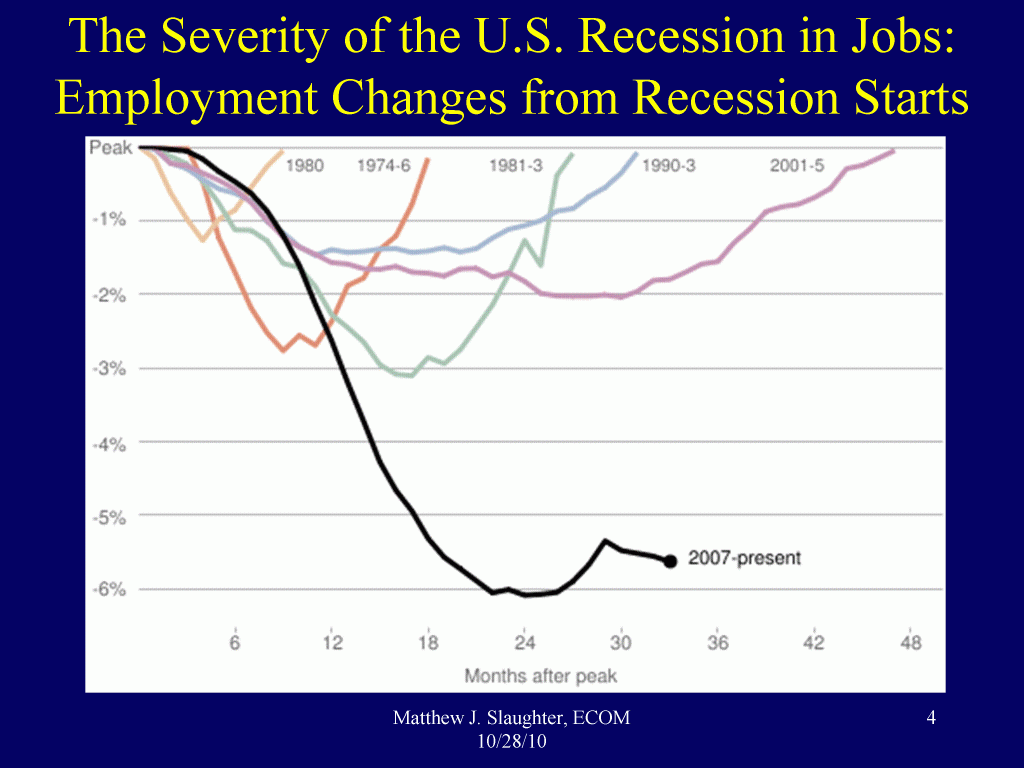I don’t know the question, but the answer is jobs.
 Some sobering facts: (figure and facts from Matt Slaughter)
Some sobering facts: (figure and facts from Matt Slaughter)
- During the Great Recession, US job loss (peak to trough) was 8.4 million payroll jobs were lost (6.1%) and 8.5 million private-sector jobs (7.3%).
- In Sept. 2010 there were 108 million U.S. private-sector payroll jobs, about the same as in March 1999.
- It took 48 months to regain the lost 2.0% of jobs in the 2001 recession. At that rate, the U.S. would again reach 12/07 total payroll jobs around January 2020.
The US has a big problem. And I sure as hell hope we are willing do the hard work and make the hard sacrifices to turn things around.
To me it’s all about jobs. To create jobs, real jobs, the US has got to become a more affordable place to invent, design, and manufacture products. Certainly modified tax policies will help and so will trade agreements to make it easier for smaller companies to export products. But those will take too long. We need something now.
To start, we need affordability through productivity. But not the traditional making stuff productivity, we need inventing and designing productivity.
Here’s the recipe: Invent technology in-country, design and develop desirable products in-country (products that offer real value, products that do something different, products that folks want to buy), make the products in-country, and sell them outside the country. It’s that straightforward.
To me invention/innovation is all about solving technical problems. Solving them more productively creates much needed invention/innovation productivity. The result: more affordable invention/innovation.
To me design productivity is all about reducing product complexity through part count reduction. For the same engineering hours, there are few things to design, fewer things to analyze, fewer to transition to manufacturing. The result: more affordable design.
Though important, we can’t wait for new legislation and trade agreements. To make ourselves more affordable we need to increase productivity of our invention/innovation and design engines while we work on the longer term stuff.
If you’re an engineering leader who wants more about invention/innovation and or design productivity, send me an email at
and use the subject line to let me know which you’re interested in. (Your contact information will remain confidential and won’t be shared with anyone. Ever.)
Together we can turn around the country’s economy.
 Mike Shipulski
Mike Shipulski
There is a lot in the news this morning that relates directly to your point, here, Mike. And it’s a lot more than I can be comfortable with. It doesn’t take much thought to see that our country is probably going to learn the hard lesson that the production of durable goods is the basis for our successful economy (and as of late…it’s recovery), and not services. And invention & innovation is the backbone of production and manufacturing.
I agree, William, that risk is a problem, and more productive inventing can help reduce the risk and improve the reward. I have used a process to narrow the problem to its essence and definite it as narrowly as possible (but not too narrowly) and have found it a great, fast way to invent a solution. I have found that much time and energy is spent solving the wrong problem.
The number 1 import from China? computers and electronics. The number 1 export to China? Waste paper and scrap metal.
http://www.usnews.com/opinion/blogs/jodie-allen/2010/3/3/americas-biggest-trade-export-to-china-trash.html
The average Joe, with a less than average (by world standards) high school education, is toast. Trying to compete with someone half a world away with a better education, who frankly works harder and longer for substantially less pay, in conditions which include lower environmental and safety requirements, substantially less government in general, and more a favorable trade climate (compare US tariffs to China or India or Bangladesh) is pure folly. No amount of innovation is going to raise Joe back to what he believes is his middle class birthright, since it is axiomatic that any job that Joe can perform, his working class competitor on another continent can also perform at a fraction of the cost.
Alternately, getting the 300+ million in the US to be innovators smacks of the belief that we’re going to become a service economy, a drumbeat I started hearing 20 years ago. How many loan originators and media consultants can an economy support? Our days as a nation of consumers will end sooner rather than later, not because we’re suddenly going to return to a nation of producers, but because others will stop loaning us their real savings (where real savings = amount produced – amount consumed) to purchase their tangible goods.
We’ll continue to have our innovators and multigozillionaires but overall, the trend as a nation is worrisome.